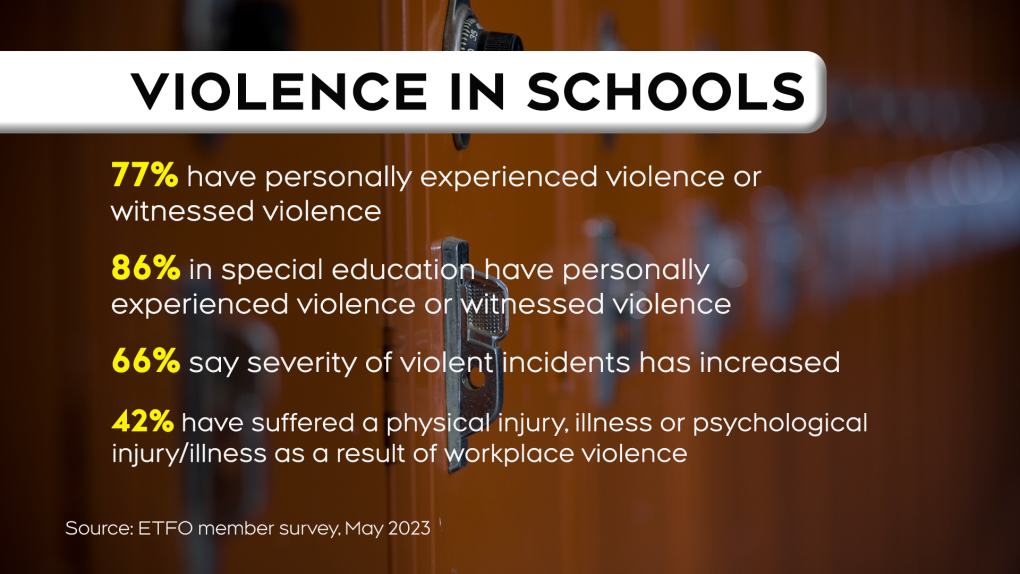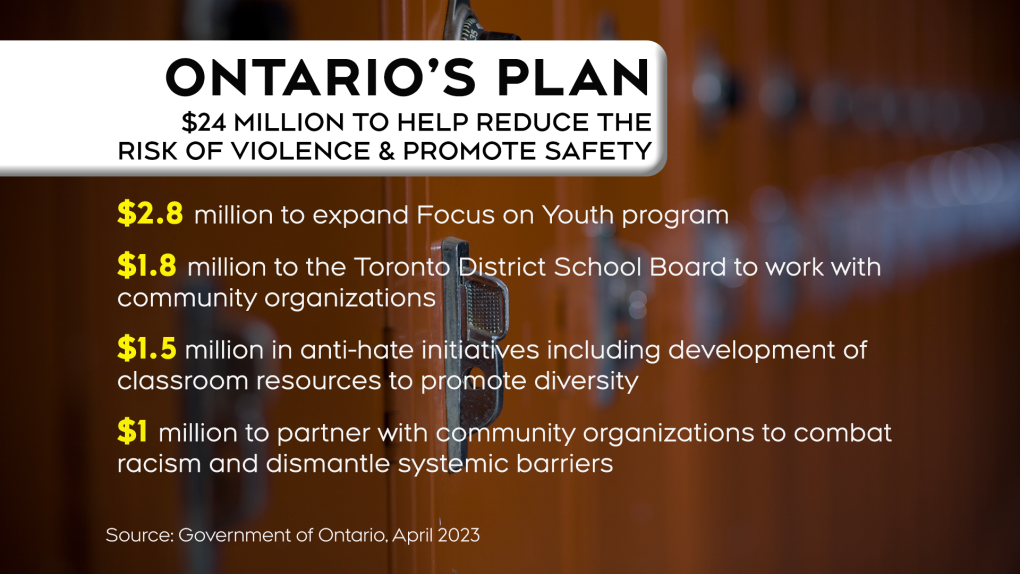'We don’t have the support staff that we need': Union calls for greater supports to tackle rising school violence
Violence is on the rise at schools across Ontario and the country — and now the union representing affected teachers is aiming to ring the alarm bell with the Ministry of Education.
On Wednesday, in an interview with CTV News Windsor, Mario Spagnuolo, president of the Greater Essex County Teacher Local for the Elementary Teachers’ Federation of Ontario (ETFO), pointed to a need for greater support staff to help ensure a safe classroom environment.
“The number one concern is, we don’t have the support staff that we need, they’re not being replaced when they’re absent and we have a fear for student safety and for our own safety as workers; that’s the message that we’re hearing [at schools],” said Spagnuolo.
According to Spagnuolo, the Greater Essex County District School Board (GECDSB) is seeing 60 to 80 support staff absent each day across the board and not replaced. The GECDSB did not agree to an interview request from CTV News.
“I think if you talk to parents and staff as well you would hear that, ‘We can do better as a province, we just need a government that’s going to support us,’” said Spagnuolo.
ETFO MEMBER SURVEY
The ETFO Member Survey was released in May and outlines what it describes as an “alarming” number of respondents reporting personal experience with violence.
According to the survey, 77 per cent of ETFO members have personally experienced or witnessed violence against a staff member.
“I’m not surprised because it reflects what we’re hearing at the union office every day and our schools,” said Spagnuolo.
ETFO represents about 83,000 members including public elementary teachers, educational support workers and professional support personnel.
The survey indicates a dire situation for special education staff, with 86 per cent reporting personal experience with violence or reporting having witnessed violence against another staff member.
When it comes to severity of the violence, the survey shows 66 per cent of respondents believe it has increased and 42 per cent say they’ve suffered physical injury, illness or psychological injury or illness as a result of workplace violence.

“Now it’s become such a prevalent issue,” said Spagnuolo. “We don’t have the support staff that we need. The needs of the students has increased, I would say in the last 10 years, steadily we’ve seen student needs increase and the support staff hasn’t increased with that to the degree that’s needed.”
ONTARIO’S PLAN
In April, the Ontario government announced funding meant to target the rising trend of violence in schools.
The $24-million plan included $2.8 million to expand the Focus on Youth program, which aims to provide high quality programming for youth and employment opportunities for high school students. There’s also $1.5 million earmarked for anti-hate initiatives and $1 million to help schools partner with community groups to combat racism and dismantle systemic barriers.
A Ministry of Education spokesperson points to new hires as a key plank of its plan to reduce violence in schools.
“To enhance classroom learning, we have hired 7,500 net new staff, including 3,500 educational assistants,” said Isha Chaudhuri, a spokesperson for the ministry.
The ministry also points to a nearly $700 million increase in funding for the 2023-24 school year, including the additional $24 million to reduce violence and promote safety. However, Spagnuolo argues per student funding, which forms the base of funding for school boards, doesn’t keep up with inflation and trustees will struggle to balance budgets as a result.
The Ontario Public School Boards’ Association says the education budget increase is $66 on a per pupil basis equating to a 0.5 per cent increase.
Chaudhuri points to increased funding to support mental health resources as a key measure to leverage funds to help students and promote a safer school environment.
“To better support Ontario students with mental health resources, our government is investing $114 million, which represents a 555 per cent increase from 2018 under the previous Liberal government,” said Chaudhuri. “We also invested in continuous mental health supports through the summer months, as well as introduced new mental health modules developed with School Mental Health Ontario along with the support of SickKids that provide a tool-kit of practical knowledge to manage stress and keep kids safe and focused in school.”

MINISTRY STATEMENT
To support student mental health and well-being in 2023-24, Ontario is investing about $114 million.
The majority of this funding ($87.7 million) is secured in the Grants for Student Needs (GSN), which provides stable funding to support long term planning, staff retention and program continuity for students and include:
$50.4 million to help school boards meet local needs and priorities related to mental health that include:
- $36.7 million for the Supporting Student Mental Health Allocation
- $10.5 million for the Student Mental Well-Being Allocation
- $3.2 million for the Well‐Being and Positive School Climates Allocation
- $26.5 million for the Mental Health Workers in Secondary Schools (regulated mental health professionals) that fund about 180 mental health workers in secondary schools.
- $10.8 million for Mental Health Leaders (one per each school board). Mental Health Leaders are school board staff who are senior mental health professionals working closely with School Mental Health Ontario (SMH-ON) to provide leadership support in their school board for student mental health.
This $114M in funding also includes Priorities and Partnership Fund (PPF) Funding ($26.25M):
- $12 million for the Summer Mental Health Supports to ensure the continuity of mental health services for students over the summer months.
- $6.5 million for School Mental Health Ontario
- $3.75 million towards mental health supports for racialized and marginalized students.
- $2 million to increase awareness for parents and guardians on student mental health.
- $2 million to support emerging student mental health needs.
CTVNews.ca Top Stories

Canadian team told Trump's tariffs unavoidable right now, but solutions on the table in surprise Mar-a-Lago meeting
During a surprise dinner at Mar-a-Lago, representatives of the federal government were told U.S. tariffs from the incoming Donald Trump administration cannot be avoided in the immediate term, two government sources tell CTV News.
Pedestrian killed by Via Rail train near Kingston, Ont.
Regular rail traffic has resumed with severe delays.
Muskoka reacts to major snowfall, hundreds stuck on Highway 11
From road closures, power outages, weather declarations and nonstop shovelling, Muskoka residents were faced with nearly a metre of persistent snowfall on Saturday.
Saskatoon priest accused of sexual assault says he meant to encourage young girl with hug and kiss
A Saskatoon priest accused of sexual assault says he meant to encourage and reassure a young girl when he hugged and kissed during his testimony at Saskatoon Provincial Court Friday.
Beef prices reach record highs in Canada
The cost of beef continues to rise, reaching record highs on grocery store shelves ahead of the busiest time for many grocers and butchers before the holiday season.
Trump threatens 100% tariff on the BRIC bloc of nations if they act to undermine U.S. dollar
U.S. president-elect Donald Trump on Saturday threatened 100 per cent tariffs against a bloc of nine nations if they act to undermine the U.S. dollar.
Bob Bryar, drummer for rock band My Chemical Romance, dead at 44
Bob Bryar, former drummer for the band My Chemical Romance, has died. He was reportedly 44.
Toronto man accused of posing as surgeon, giving four women injections
A 29-year-old Toronto man has been charged after allegedly posing as a surgeon and providing cosmetic procedures on several women.
'Disappointing': Toronto speed camera cut down less than 24 hours after being reinstalled
A Toronto speed camera notorious for issuing tens of thousands of tickets to drivers has been cut down again less than 24 hours after it was reinstalled.
































